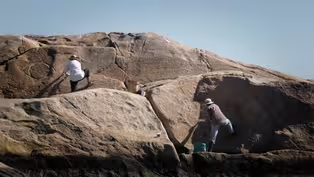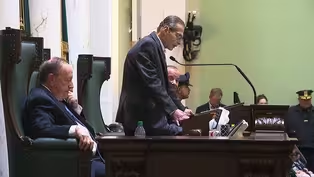
Island Water
Clip: Season 6 Episode 17 | 8m 2sVideo has Closed Captions
Prudence Island’s groundwater supply is getting less secure due to climate change.
Droughts, floods, state regulations and rising sea levels are all converging to threaten Prudence Island’s drinking water supply.
Problems playing video? | Closed Captioning Feedback
Problems playing video? | Closed Captioning Feedback
Rhode Island PBS Weekly is a local public television program presented by Ocean State Media

Island Water
Clip: Season 6 Episode 17 | 8m 2sVideo has Closed Captions
Droughts, floods, state regulations and rising sea levels are all converging to threaten Prudence Island’s drinking water supply.
Problems playing video? | Closed Captioning Feedback
How to Watch Rhode Island PBS Weekly
Rhode Island PBS Weekly is available to stream on pbs.org and the free PBS App, available on iPhone, Apple TV, Android TV, Android smartphones, Amazon Fire TV, Amazon Fire Tablet, Roku, Samsung Smart TV, and Vizio.
Providing Support for PBS.org
Learn Moreabout PBS online sponsorship- [Olivia Ebertz] Prudence Island is a small community of about 230 year rounders.
Only reachable by boat, residents live in one of the most isolated areas in Rhode Island, and although they're surrounded by Narragansett Bay, they're running out of water.
- As a child, I think everybody understood that water was a limiting factor, and we just adopted conservation strategies over time.
- [Olivia Ebertz] Robin Weber is the moderator for the Prudence Island Water District.
She's been trying to solve Prudence's water woes for 11 years.
- We used to have very small summertime cottages that were occupied only for a few months a year.
Now those are being knocked down and larger homes are being built with, you know, the full heat and the water use and, you know, washing machines.
- [Olivia Ebertz] The community says it has only two wells to serve all of its customers on the nearly thousand acre island.
The infrastructure is aging and there's no backup water supply.
Part of your charge is to ensure that people who are tied into the water district get water.
That water doesn't run out.
Do you ever have trouble meeting the needs of the people who are.
- We have had difficulty meeting the needs.
Our worst instance of that is we lost our primary production well, the pump failed.
We came very, very close to complete dewatering of the system.
We managed to get through.
We had an emergency pump installed and were back in business.
But it literally took about a week and we were very, very close.
If not for an operator getting up in the night, and coaxing that well to produce, we would've been in big, big trouble.
- [Olivia Ebertz] And scientists say climate change is compounding the island's risks.
- We have to start thinking about the sea level rise.
Sea level rise is happening.
- [Olivia Ebertz] Hydrologist, Soni Pradhanang says that this sea level rise could permeate Prudence Island's water supply.
- Storm water surges, this storm surge and sea level rise will have quite impact on the coastal communities and islands being surrounded fully by water, salt water.
They're prone to salt water intrusion.
- [Olivia Ebertz] Pradhanang has a table where she and her graduate students can map various rising sea level scenarios, including one that illustrates just how this might play out on Prudence Island.
- Once we run water through the system, the water will start seeping in under the ground recharging the water table.
- [Olivia Ebertz] This salt water seeping in can damage infrastructure.
And scientists say it is notoriously difficult to treat and can be dangerous in the long term to residents' health.
- Salt water intrusion is a slow creeping of salt water under the ground.
The island's, the geology of island, you know these, they will have a fresh water and salt water.
Fresh water lands, you know, atop of salt water.
And when the sea level rises, the salt water wedge can slowly creep in and it'll also rise due to the sea level rise.
- [Olivia Ebertz] According to data from the National Oceanic and Atmospheric Administration, in one of the most drastic scenarios, the sea is set to rise by about nine feet by the end of the century.
- And the volume of fresh water that's available can shrink significantly, which means the amount of water that's available for, you know, consumption purpose of various, various consumption purposes will reduce.
But then there's also like storm surge also could impact well water by, you know, like the topping or inundation by over topping.
So that's a double whammy.
- [Olivia Ebertz] But rising sea level's not the only issues facing Prudence Island and Robin Weber has witnessed some of these changes firsthand.
- We've had decades of winter moth, we had gypsy moth infestation, and you can really see it on the landscape.
We no longer have what you would consider a closed canopy forest on the island.
And that has changed in the last 15, 20 years.
- [Olivia Ebertz] On a walk through the largest forested area on the island, Robin points out trees that look ill. During a prolonged statewide drought starting in 2014, invasive gypsy moths descended on the trees, eating as many of their leaves as possible, and eventually killing much of the forestation.
- And the summer of that year, those years looked more like fall because leaves are all eaten up, right?
And when it falls into the water, like it was everywhere, for sure, you know, you can't walk along the forest.
They will, it will find a little bug on your head.
It's literally everywhere.
- [Olivia Ebertz] Scientists say, because of climate change, we now get more intense bouts of rainfall.
It often falls more quickly than the ground can soak it up and then runs off back into the bay.
Tree root systems can help capture that extra water.
So when the moths began killing trees on Prudence Island, the ground got even drier.
- So you are causing that dry and adding that dryness even more to the system.
So it's basically, it circles.
- [Olivia Ebertz] These climate change issues are something the community says they've not had the time or money to address.
That's because their all volunteer water board has been busy with the project to chlorinate one of their wells.
In the meantime, they've been on a boil water notice for six years due to one positive E. coli test back in 2018.
- Now we're in a position where everything that we need to move forward with the project is actually in place, finally.
- [Olivia Ebertz] Now Robin says she can shift her focus on trying to secure the islanders additional water, but the most promising stores are located on state land.
And there's a clause in the deed that prevents the water board from drilling wells there.
Robin says her attempts to get the state to change the clause have been unsuccessful so far.
- That's our real challenge, is that we don't have anywhere to drill.
- What would happen to Prudence Island if fresh water resources run out, what would happen to the community here?
- I think it would probably cease to exist.
Video has Closed Captions
Clip: S6 Ep17 | 7m 33s | Anti-graffiti vigilantes’ fight vandalism along Rhode Island’s shore. (7m 33s)
Video has Closed Captions
Clip: S6 Ep17 | 4m 58s | Tributes pour in for Rhode Island’s late Senate President Dominick Ruggerio. (4m 58s)
Providing Support for PBS.org
Learn Moreabout PBS online sponsorship
- News and Public Affairs

Top journalists deliver compelling original analysis of the hour's headlines.

- News and Public Affairs

FRONTLINE is investigative journalism that questions, explains and changes our world.












Support for PBS provided by:
Rhode Island PBS Weekly is a local public television program presented by Ocean State Media

